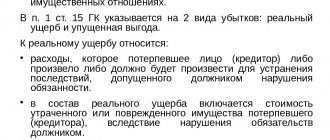The concept of legal penalties
This method of ensuring the fulfillment of an obligation borrows most of the features from the penalty as such. Its features include the following:
- this is a cash payment. An indication of this nature of the penalty is contained in Art. 330 GK. Payment by transfer of other property is not allowed without the appropriate agreement of the parties to the obligation. The text of the relevant act must provide for the amount or formula by which the payment will be calculated;
- a legal penalty is applied in cases where the debtor fulfilled the obligation with violations or did not fulfill it at all. Only these situations are taken into account, since other circumstances indicate appropriate actions by the party. The law must directly indicate the application of a penalty for a specific violation;
- this penalty can only be established in a federal legislative act. Its application is not permitted on the basis of decisions of executive bodies. The adoption of such acts by regional authorities contradicts the principle of the unity of economic space;
- the obligation to pay the appropriate amount does not depend on the presence or absence of losses to the creditor. When collecting it by this person, he does not have to prove the existence of harm caused.
Taking these features into account, we can obtain the following definition.
A legal penalty is a sum of money established in federal legislation or a formula for calculating it, which the debtor is obliged to pay in case of violation of the terms of certain obligations, regardless of the fact of causing losses.
Penalty structure
If we consider a penalty as a way of punishing an irresponsible partner (if the relationship is regulated by a commercial agreement) or an individual (legal) person (if the parties to the relationship are a civilian and control and supervisory authorities), then it can be divided into two components. This is a fine and penalty.
Both the first and second concepts are part of the penalty. Which of the following will be included in the structure of the amount of money obligatory for payment will be determined either by the framework of the contract or by legal norms in each specific case.
It is worth noting that the most attractive way to resolve violated obligations is a penalty. The reason for this is the fact that in order to receive the amounts owed, the injured party is not required to prove the fact of economic damage. The mere fact of violation of the terms of the contract or the law is sufficient. Although these violations may not cause material damage or lost economic benefits.
But the prescribed amounts of penalties in the form of fines and interest are not always unshakable for the parties. In practice, the violator often proves through the court unreasonably inflated amounts of penalties and pays amounts that are commensurate with the violations identified.
Types of legal penalties
As in the case of a contractual penalty, a legal penalty provides for a number of classifications.
Depending on how it is calculated, it may represent a fixed amount, a certain percentage, or another method.
Most often, the size of this payment is linked to the refinancing rate.
Depending on the nature of this penalty, it may represent a fine or penalty. The first refers to a one-time payment for a violation. The law may provide for both a fixed payment and a calculation based on the cost of the violated obligation multiplied by a certain percentage. The penalty represents a daily accrued amount. It accumulates until the debtor fulfills his obligations. In this case, the refinancing rate is also widely used.
Useful links on the topic “Forfeit: concept, types, reduction”
- Changes to Articles 1 - 10 of the Civil Code of the Russian Federation
- Compensation for losses (Article 15 of the Civil Code)
- Changes to Article 48 - 12328 of the Civil Code of the Russian Federation - provisions on legal entities
- Changes to the Civil Code of the Russian Federation:
- Objects of civil rights (Articles 128 - 136)
- Securities (Articles 142 - 1495)
- Intangible benefits and their protection (Articles 150 - 1522)
- Transactions (Articles 1571 - 1651)
- Invalidity of transactions (Articles 166 - 181)
- Decision of the meetings (Articles 1811 - 1815)
- Representation. Power of attorney (Articles 182 - 1881)
- Limitation period (Articles 196 - 207)
- Amendments to the Civil Code of the Russian Federation introduced by Law No. 367-FZ of December 21, 2013 (Articles 334 - 3922 of the Civil Code)
- Changes to Articles 307 - 395 of the Civil Code of the Russian Federation regarding the law of obligations
- Changes to the general provisions of the contract (Articles 4291 - 4491)
- Amendment and termination of the contract (Articles 450 - 453)
Amount of legal penalty
The size is a prerequisite for the validity of the penalty. The law must contain an indication of a specific monetary amount or the procedure for calculating it. The latter assumes the possibility of obtaining an unambiguous result by performing simple mathematical operations.
These often include the use of a percentage of the contract price.
Another mathematical method is to use a base indicator, which is multiplied by coefficients. An example is the refinancing rate. If the penalty is in the nature of a penalty, then the amount of the debt is multiplied by this indicator and divided by 1/300. The result obtained corresponds to the daily amount of accruals. The total amount that the legal penalty will be is calculated by multiplying the resulting indicator by the actual number of days of delay.
Collection of penalties according to law or contract
The amount of the penalty can be recovered in court in accordance with the rules of the Code of Civil Procedure of the Russian Federation or the Arbitration Procedure Code of the Russian Federation. Liquidated damages are usually a related claim to other claims (for example, debt collection).
Reducing penalties in court
If a penalty is collected from you, you can apply for a reduction in the amount of the penalty.
The current judicial practice of courts of general jurisdiction and arbitration courts makes it possible to reduce not only contractual, but also legal penalties, justifying this by the compensatory nature of civil liability, which is not aimed at enriching the counterparty to the transaction.
Such a reduction is possible if the consequences of breach of obligation are clearly disproportionate to the penalty specified in the contract or law.
The arbitration courts, when resolving the issue of proportionality of the penalty to the consequences of violation of a monetary obligation and for this purpose, determining the amount sufficient to compensate for the creditor's losses, proceeded from the double discount rate (rates) of the Bank of Russia that existed during the period of such violation (this position is enshrined in the Resolution of the Plenum of the Supreme Arbitration Court of the Russian Federation ).
Grounds and procedure for collecting legal penalties
In order for the creditor to have the right to demand payment of a legal penalty, the following conditions must coincide.
- the debtor commits violations for which it is established. The law must clearly indicate such actions or inactions;
- the behavior of the obligated subject must be culpable.
If at least one of these conditions is missing, the collection of a legal penalty will be denied. This mainly applies to cases of absence of guilt. This situation is characterized by the impact of force majeure and other circumstances that do not depend on the will of the debtor.
When collecting such a penalty, it is necessary to draw up a claim, make a calculation and send the specified documents to the counterparty. In some cases, the law makes this procedure mandatory.
If the addressee does not comply with the requirements, the creditor has the right to file a corresponding claim. The choice of court will depend on what types of legal relations served as the basis for calculating the penalty. If we are talking about entrepreneurial activity, then it is necessary to apply to arbitration. In other situations, the application is sent to a court of general jurisdiction.
The accrual of a legal penalty can be made regardless of the presence of similar conditions in the contract.
Article 330. Concept of penalty
- A penalty (fine, penalty) is an amount of money determined by law or contract that the debtor is obliged to pay to the creditor in the event of non-fulfillment or improper fulfillment of an obligation, in particular in the case of delay in fulfillment. Upon a claim for payment of a penalty, the creditor is not required to prove that he suffered losses.
- The creditor has no right to demand payment of a penalty if the debtor is not responsible for non-fulfillment or improper fulfillment of the obligation.
Commentary on Article 330 of the Civil Code
The essence of the penalty is the threat it creates for the debtor of a certain property disadvantage in cases of non-fulfillment or improper fulfillment of the obligation. Therefore, a penalty is one of the forms of sanctions in an obligation, i.e. integral element of the obligation itself.
The security function of a penalty is that it is an additional sanction for non-fulfillment or improper fulfillment of an obligation in addition to the general sanction in the form of compensation for losses (Article 393 of the Civil Code).
It manifests itself, firstly, in the fact that losses can be recovered only if they actually occurred, while a penalty can be recovered regardless of the specified circumstances. According to paragraph 1 of Art. 330 of the Civil Code, upon a demand for payment of a penalty, the creditor is not required to prove the infliction of losses on him.
Secondly, the amount of damages, especially in the case of continued violations by the debtor of its obligations, is determined only in the future, after the fact of non-fulfillment or improper fulfillment of the obligation. On the contrary, the amount of the penalty is known in advance, which significantly facilitates and makes its collection inevitable. In any case, the creditor can collect a penalty without waiting for either the occurrence of losses or an accurate determination of their amount.
Thirdly, the more importance is attached to the fulfilled obligation, the higher the amount of the penalty is established and the more clearly its punitive nature is manifested. At the same time, if the amount of the penalty to be collected is clearly disproportionate to the consequences of the violation of the obligation, the court has the right, at its discretion, to reduce the penalty (Article 333 of the Civil Code).
When collecting a penalty, the injured party to the contract proves only the fact of violation by the counterparty. There is no need to prove and justify the amount of losses incurred (which, as a rule, is not an easy matter) and the causal connection between their occurrence and the actions of the offender, as well as the guilt of the latter (which is presumed). All this makes it easier to collect penalties and makes it the most common measure of liability in contractual relations.
The penalty can be a fine (a one-time charge, a predetermined sum of money) or a penalty (a certain percentage of the debt amount, established in case of delay in its execution and subject to periodic payment, i.e., essentially a continuing penalty (for example, 0.5% of the amount of the overdue loan for each month of delay)).
To denote a penalty, three terms are used: the actual “forfeit”, “fine” and “penalty”. Recent judicial practice allows us to assert that, no matter what this measure is called - a fine or a penalty, it has no practical significance, just as their incorrect use has no legal consequences.
Paragraph 2 of Article 330 of the Civil Code specifically states that the creditor has no right to demand payment of a penalty if the debtor is not responsible for non-fulfillment or improper fulfillment of the obligation. This confirms that the legislator considers the penalty as one of the forms of civil liability, therefore the rules and principles of civil liability with the features provided for in Articles 330 - 333 of the Civil Code apply to the penalty. For example, the Ruling of the Supreme Arbitration Court of the Russian Federation dated December 12, 2011 No. VAS-16358/11 in case No. A56-57984/2010 states that in refusing to satisfy the claims, the courts were guided by paragraph 1 of Article 416 of the Civil Code and, recognizing that the obligations of the parties under a government contract were terminated by impossibility of performance, which was caused by a circumstance for which neither party to the obligation is responsible. The impossibility of fulfilling the obligation arose even before the deadline for its fulfillment. On this basis, the courts concluded that, by virtue of paragraph 2 of Article 330 of the Civil Code, it is impossible to impose civil liability on the plant in the form of a penalty for improper fulfillment of an obligation.
In addition, a penalty as a measure of liability cannot be applied for termination of a contract at the initiative of one of the parties, even if such a condition is expressly provided for in it. In court decisions, this approach is explained by the fact that refusal of a contract, by its legal nature, is a lawful action and cannot be considered as a violation for which a penalty could be applied (Resolution of the Federal Arbitration Court ZSO dated December 17, 2013 in case No. A45-30039/ 2012).
According to the general rule developed by judicial practice, a penalty cannot be combined with other measures of liability (interest under Article 395 of the Civil Code, increased interest, etc.), since the rules of Chapter 25 of the Civil Code do not provide for the possibility of applying two measures of liability at once for violation of the same obligation ( for example, Resolution of the Presidium of the Supreme Arbitration Court of the Russian Federation of January 20, 1998 No. 253/97 in case No. K1-3421/96). In addition, the Resolution of the Federal Antimonopoly Service of the Volga District dated January 25, 2013 in case No. A55-16241/2012 states that the provisions of Chapter 25 of the Civil Code do not provide for the possibility of charging a penalty on the amount of the penalty (fine).
However, according to some courts (Resolution of the Ninth Arbitration Court of Appeal dated June 27, 2016 in case No. A40-198923/15; Resolution of the Ninth Arbitration Court of Appeal dated June 28, 2016 in case No. A40-214639/15), the creditor has the right to receive from the debtor and penalty, and legal interest, because accrual of interest under Article 317.1 of the Civil Code of the Russian Federation is not a measure of liability, but the collection of fees for the use of capital. In this regard, they can be collected along with a contractual penalty or interest for the use of other people's funds.
In its Resolution, the Arbitration Court of the North-Western District dated 07/01/2016 in case No. A56-57311/2015 noted that the simultaneous collection of these amounts is legal, justifying this by the fact that interest on a commercial loan is a fee for the use of money, while contractual penalty is a measure of liability.
The Supreme Court of the Russian Federation in its review of judicial practice No. 2 (2016) (approved by the Presidium of the Supreme Court of the Russian Federation on July 6, 2016) noted the following:
- If the plaintiff substantiates the requirement to collect the amount of the sanction for delay in fulfilling a monetary obligation by reference to clause 1 of Art. 395 of the Civil Code of the Russian Federation, when the law or contract provides for a penalty (first paragraph of paragraph 1 of Article 394 of the Civil Code of the Russian Federation), the court brings up for discussion by the parties the question of the need to apply paragraph 1 of Art. to the legal relations of the parties. 330 or clause 1 of Art. 322 of the Civil Code of the Russian Federation on penalties.
In this case, the plaintiff can accordingly increase or decrease the amount of claims based on the terms of the contract or the provisions of the law on penalties, and the defendant can declare the application of Art. 333 of the Civil Code of the Russian Federation and provide relevant evidence.
- If the amount of interest calculated on the basis of Art. 395 of the Civil Code of the Russian Federation exceeds the amount of the penalty, the court, when establishing the fact of violation of a monetary obligation, satisfies the claims partially within the amount of the penalty to be collected.
- In itself, the fact that the plaintiff substantiates his demand for the application of a measure of liability in the form of collection of a sum of money for non-fulfillment or improper fulfillment of the monetary obligation of paragraph 1 of Art. 395 of the Civil Code of the Russian Federation, while the law or agreement of the parties in the event of this violation provides for a corresponding penalty and funds must be recovered from the defendant in favor of the plaintiff on the basis of clause 1 of Art. 330 or clause 1 of Art. 332 of the Civil Code of the Russian Federation, is not a basis for refusal to satisfy the stated requirement.
Article 333. Reduction of penalties
(as of 07/01/2020)
- If the penalty payable is clearly disproportionate to the consequences of the violation of the obligation, the court has the right to reduce the penalty. If the obligation is violated by a person carrying out entrepreneurial activities, the court has the right to reduce the penalty, subject to the debtor's application for such a reduction.
- A reduction of the penalty determined by the contract and payable by the person carrying out business activities is allowed in exceptional cases if it is proven that the collection of the penalty in the amount stipulated by the contract may lead to the creditor receiving an unjustified benefit.
- The rules of this article do not affect the debtor’s right to reduce the amount of his liability on the basis of Article 404 of this Code and the creditor’s right to compensation for losses in cases provided for in Article 394 of this Code.
Commentary on Article 333 of the Civil Code
According to the explanations given in the Resolution of the Plenum of the Supreme Court of the Russian Federation dated March 24, 2016 No. 7 “On the application by courts of certain provisions of the Civil Code of the Russian Federation on liability for violation of obligations”:
- The payable penalty established by law or contract, if it is clearly disproportionate to the consequences of violation of the obligation, can be reduced in court (clause 1 of Article 333 of the Civil Code of the Russian Federation).
Pre-established terms of the agreement on the non-application or limitation of the application of Article 333 of the Civil Code of the Russian Federation are void (clauses 1 and 4 of Article 1, clause 1 of Article 15 and clause 2 of Article 168 of the Civil Code of the Russian Federation) (clause 69 of the Resolution of the Plenum of the Supreme Court of the Russian Federation dated March 24, 2016 No. 7) .
- Within the meaning of Articles 332, 333 of the Civil Code of the Russian Federation, the establishment in the contract of a maximum or minimum amount (upper or lower limit) of a penalty is not an obstacle to its reduction by the court (clause 70 of the Resolution of the Plenum of the Supreme Court of the Russian Federation dated March 24, 2016 No. 7).
- If the debtor is a commercial organization, an individual entrepreneur, as well as a non-profit organization when it carries out income-generating activities, the reduction of the penalty by the court is allowed only upon a substantiated application of such a debtor, which can be made in any form (clause 1 of Article 2, clause 1 of Article 6, clause 1 Article 333 of the Civil Code of the Russian Federation).
When collecting a penalty from other persons, the rules of Article 333 of the Civil Code of the Russian Federation can be applied not only at the request of the debtor, but also at the initiative of the court, if there is an obvious disproportion of the penalty to the consequences of violation of the obligation (clause 1 of Article 333 of the Civil Code of the Russian Federation). In this case, when considering the case, the court brings up for discussion circumstances indicating such disproportionality (Article 56 of the Code of Civil Procedure of the Russian Federation, Article 65 of the Code of Arbitration Procedure of the Russian Federation). If there is evidence in the case confirming the obvious disproportion of the penalty to the consequences of violation of the obligation, the court reduces the penalty according to the rules of Article 333 of the Civil Code of the Russian Federation.
The defendant’s statement about the obvious disproportion of the penalty to the consequences of violation of the obligation does not in itself constitute an acknowledgment of the debt or the fact of violation of the obligation (paragraph 71 of the Resolution of the Plenum of the Supreme Court of the Russian Federation dated March 24, 2016 No. 7).
- The defendant’s application for the application of the provisions of Article 333 of the Civil Code of the Russian Federation can be made exclusively when considering the case by the court of first instance or the court of appeal if it proceeded to consider the case according to the rules of proceedings in the court of first instance (Part 5 of Article 330, Article 387 of the Civil Procedure Code of the Russian Federation, part 6.1 of article 268, part 1 of article 286 of the Arbitration Procedure Code of the Russian Federation).
If the reduction of the penalty is allowed at the initiative of the court, then the issue of such a reduction can also be raised for discussion of the parties by the court of appeal, regardless of whether it proceeds to consider the case according to the rules of proceedings in the court of first instance (parts 1 and 2 of Article 330 of the Code of Civil Procedure of the Russian Federation, parts 1 and 2 of Article 270 of the Arbitration Procedure Code of the Russian Federation).
The grounds for canceling a judicial act in cassation in the part relating to the reduction of the penalty according to the rules of Article 333 of the Civil Code of the Russian Federation may be a violation or incorrect application of substantive law, which, in particular, includes a violation of the requirements of paragraph 6 of Article 395 of the Civil Code of the Russian Federation, when the amount of the penalty for late fulfillment of a monetary obligation is reduced below the limit established by paragraph 1 of Article 395 of the Civil Code of the Russian Federation, or a reduction of the penalty in the absence of an application in the cases established by paragraph 1 of Article 333 of the Civil Procedure Code of the Russian Federation (Article 387 of the Civil Procedure Code of the Russian Federation, paragraph 2 of part 1 of Article 287 of the Arbitration Procedure Code of the Russian Federation) (clause 72 Resolution of the Plenum of the Supreme Court of the Russian Federation dated March 24, 2016 No. 7).
- The burden of proving the disproportionate penalty and the unreasonableness of the creditor's benefit rests with the defendant. The disproportionate and unreasonable nature of the benefit can be expressed, in particular, in the fact that the possible amount of losses of the creditor that could arise as a result of a violation of the obligation is significantly lower than the accrued penalty (Part 1 of Article 56 of the Code of Civil Procedure of the Russian Federation, Part 1 of Article 65 of the Code of Arbitration Procedure of the Russian Federation). The defendant’s arguments about the impossibility of fulfilling the obligation due to a difficult financial situation, the presence of debt to other creditors, the seizure of funds or other property of the defendant, the lack of budget financing, non-fulfillment of obligations by counterparties, voluntary repayment of the debt in full or in part on the day of consideration of the dispute, the defendant’s fulfillment of social significant functions, the debtor’s obligation to pay interest for the use of funds (for example, on the basis of Articles 317.1, 809, 823 of the Civil Code of the Russian Federation) cannot in themselves serve as a basis for reducing the penalty (paragraph 73 of the Resolution of the Plenum of the Supreme Court of the Russian Federation dated March 24, 2016 No. 7).
- When objecting to an application to reduce the amount of the penalty, the creditor is not obliged to prove the occurrence of losses (clause 1 of Article 330 of the Civil Code of the Russian Federation), but has the right to present evidence of the consequences of such violations of obligations for a creditor acting reasonably and prudently under comparable circumstances, for example, indicate changes in average market indicators (interest rates on loans or market prices for certain types of goods in the corresponding period, exchange rates, etc.) (clause 74 of the Resolution of the Plenum of the Supreme Court of the Russian Federation dated March 24, 2016 No. 7).
- When assessing the proportionality of the penalty to the consequences of breach of obligation, it is necessary to take into account that no one has the right to take advantage of their illegal behavior, and also that the unlawful use of other people’s funds should not be more profitable for the debtor than the conditions for lawful use (paragraphs 3, 4 of Article 1 Civil Code of the Russian Federation).
Evidence of the validity of the amount of the penalty may include, in particular, data on the average fee for short-term loans to replenish working capital issued by credit institutions to persons engaged in business activities, or fees for short-term loans issued to individuals at the location of the creditor during the period of violation of the obligation , as well as inflation rates for the corresponding period.
Having established the grounds for reducing the amount of the penalty, the court reduces the amount of the penalty (clause 75 of the Resolution of the Plenum of the Supreme Court of the Russian Federation dated March 24, 2016 No. 7).
- The rules of Article 333 of the Civil Code of the Russian Federation and paragraph 6 of Article 395 of the Civil Code of the Russian Federation do not apply when collecting interest accrued under Article 317.1 of the Civil Code of the Russian Federation.
The rules of paragraph 6 of Article 395 of the Civil Code of the Russian Federation do not apply when reducing the penalty established for violation of a non-monetary obligation, unless otherwise provided by law (paragraph 76 of the Resolution of the Plenum of the Supreme Court of the Russian Federation dated March 24, 2016 No. 7).
- A reduction in the amount of a contractual penalty payable by a commercial organization, an individual entrepreneur, as well as a non-profit organization that has violated an obligation while carrying out income-generating activities, is allowed in exceptional cases if it is clearly disproportionate to the consequences of violating the obligation and may entail the creditor receiving an unjustified benefit (paragraphs 1 and 2 of Article 333 of the Civil Code of the Russian Federation) (clause 77 of the Resolution of the Plenum of the Supreme Court of the Russian Federation dated March 24, 2016 No. 7).
- The rules for reducing the amount of the penalty on the basis of Article 333 of the Civil Code of the Russian Federation also apply in cases where the penalty is determined by law, for example, Articles 23, 23.1, paragraph 5 of Article 28, Articles 30 and 31 of the Law of the Russian Federation of February 7, 1992 N 2300-1 " On the Protection of Consumer Rights" (hereinafter referred to as the Law on the Protection of Consumer Rights), paragraph 21 of Article 12 of the Law on OSAGO, the provisions of the Federal Law of January 10, 2003 N 18-FZ "Charter of Railway Transport of the Russian Federation", Article 16 of the Federal Law of December 29 1994 N 79-FZ “On the State Material Reserve”, paragraph 5 of Article 34 of the Federal Law of April 5, 2013 N 44-FZ “On the contract system in the field of procurement of goods, works, services to meet state and municipal needs” (paragraph 78 Resolution of the Plenum of the Supreme Court of the Russian Federation dated March 24, 2016 No. 7).
- In the event that, at the request of the creditor, a penalty is written off from the debtor’s account (clause 2 of Article 847 of the Civil Code of the Russian Federation), as well as the amount of the penalty is offset against the amount of the principal debt and/or interest, the debtor has the right to raise the question of applying the provisions of Article 333 of the Civil Code of the Russian Federation to the written-off penalty, for example, by presenting an independent demand for the return of what was overpaid (Article 1102 of the Civil Code of the Russian Federation).
At the same time, if the payable penalty is transferred by the debtor himself, he does not have the right to demand a reduction in the amount of such a penalty on the basis of Article 333 of the Civil Code of the Russian Federation (subparagraph 4 of Article 1109 of the Civil Code of the Russian Federation), unless he proves that the transfer of the penalty was involuntary , including due to the creditor’s abuse of its dominant position (clause 79 of the Resolution of the Plenum of the Supreme Court of the Russian Federation dated March 24, 2016 No. 7).
- If demands are made for the collection of a penalty established by the contract in the form of a combination of a fine and a penalty for one violation, and the debtor asks to reduce its amount on the basis of Article 333 of the Civil Code of the Russian Federation, the court considers the issue of proportionality of the penalty to the consequences of violation of obligations based on the total amount of the fine and penalty (clause 80 Resolution of the Plenum of the Supreme Court of the Russian Federation dated March 24, 2016 No. 7).
- If the failure to fulfill or improper fulfillment of an obligation occurred through the fault of both parties, or the creditor intentionally or negligently contributed to an increase in the amount of the penalty or acted in bad faith, the amount of liability of the debtor may be reduced by the court on these grounds in accordance with the provisions of Article 404 of the Civil Code of the Russian Federation, which in the future does not exclude the use Article 333 of the Civil Code of the Russian Federation.
Failure by the creditor to submit a demand for collection of the principal debt for a long time after the deadline for fulfilling the obligation cannot in itself be regarded as contributing to an increase in the amount of the penalty (clause 81 of the Resolution of the Plenum of the Supreme Court of the Russian Federation dated March 24, 2016 No. 7).
Limitation on the amount of the penalty
The amount of the penalty may be limited by law. So:
- Clause 21 of Article 5 Federal Law No. 353-FZ dated December 21, 2013 “On consumer credit (loan)” the amount of the penalty cannot exceed twenty percent per annum if, under the terms of the consumer credit (loan) agreement for the amount of the consumer credit (loan) interest is accrued for the corresponding period of violation of obligations, or if, under the terms of the consumer credit (loan) agreement, interest on the amount of the consumer loan (loan) is not accrued for the corresponding period of violation of obligations, 0.1 percent of the amount of overdue debt for each day of violation of obligations .
- Federal Law No. 217-FZ of June 23, 2021 “On Amendments to Article 9.1 of the Federal Law “On Mortgages (Pledge of Real Estate)” decided to limit the amount of penalties (fine, penalties) for non-fulfillment or improper fulfillment of obligations to repay a mortgage loan (loan) ), received by an individual for purposes unrelated to his business activities.
It cannot exceed the key rate of the Central Bank of the Russian Federation on the day of concluding the relevant agreement if, according to the agreement, interest is accrued on the amount of the loan (loan) for the corresponding period of violation of obligations. If they are not provided for, then - 0.06% of the amount of overdue debt for each day of violation of obligations.
At the same time, the Supreme Court of the Russian Federation, canceling the decisions of lower courts to reduce the penalty on the initiative of the court (Decision of the Supreme Court of the Russian Federation dated September 4, 2018 No. 46-KG18-38), considers that the reduction of the penalty in disputes arising from the agreement for participation in shared construction, concluded a citizen in order to acquire ownership of residential premises, possibly in exceptional cases and at the request of the defendant, with the obligatory indication of the reasons for the court making such a decision, noting the following:
- Part 1 of Article 6 of the Federal Law of December 30, 2004 No. 214-FZ “On participation in shared-equity construction of apartment buildings and other real estate and on amendments to certain legislative acts of the Russian Federation” (hereinafter referred to as the Law on participation in shared-equity construction) provides , that the developer is obliged to transfer the shared construction object to the participant in shared construction no later than the period specified in the contract and must be the same for participants in shared construction, to whom the developer is obliged to transfer shared construction objects that are part of an apartment building and (or) other real estate or part of a block section of an apartment building that has a separate entrance with access to a common area, except for the case established by part 3 of this article;
- in accordance with Part 2 of Article 6 of this Law, in the event of a violation of the deadline stipulated by the contract for transferring a shared construction project to a participant in shared construction, the developer pays to the participant in shared construction a penalty (penalty) in the amount of one three hundredth of the refinancing rate of the Central Bank of the Russian Federation, effective on the day of fulfillment of the obligation, of the contract price for each day of delay. If the participant in shared construction is a citizen, the penalty (penalty) provided for in this part is paid by the developer in double the amount;
- according to paragraph one of Article 333 of the Civil Code of the Russian Federation, if the penalty payable is clearly disproportionate to the consequences of breach of obligation, the court has the right to reduce the penalty;
- in paragraph 2 of paragraph 34 of the resolution of the Plenum of the Supreme Court of the Russian Federation of June 28, 2012 No. 17 “On the consideration by courts of civil cases in disputes on the protection of consumer rights” it is explained that the application of Article 333 of the Civil Code of the Russian Federation in cases of protection of consumer rights is possible in exceptional cases and at the request of the defendant with the obligatory indication of the reasons why the court believes that reducing the amount of the penalty is permissible;
- within the meaning of paragraph 71 of the resolution of the Plenum of the Supreme Court of the Russian Federation dated March 24, 2021 No. 7 “On the application by courts of certain provisions of the Civil Code of the Russian Federation on liability for violation of obligations” when collecting penalties from persons who are not commercial organizations, individual entrepreneurs, as well as non-profit organizations in the implementation of their income-generating activities, the rules of Article 333 of the Civil Code of the Russian Federation can be applied not only at the request of the debtor, but also at the initiative of the court, if there is an obvious disproportion of the penalty to the consequences of violation of the obligation. In this case, when considering the case, the court, when considering the case, brings up for discussion the circumstances indicating such disproportionality, and if there is evidence in the case confirming the obvious disproportion of the penalty to the consequences of violation of the obligation, the court reduces the penalty according to the rules of Article 333 of the Civil Code of the Russian Federation;
- by virtue of paragraph 72 (paragraph one) of the said resolution of the Plenum of the Supreme Court of the Russian Federation, the defendant’s application for the application of the provisions of Article 333 of the Civil Code of the Russian Federation can be made exclusively when considering the case by the court of first instance or the court of appeal if it proceeded to consider the case according to the rules of procedure in the court of first instance (part 5 of article 330, article 387 of the Code of Civil Procedure of the Russian Federation, part 6.1 of article 268, part 1 of article 286 of the Code of Arbitration Procedure of the Russian Federation);
- as explained in paragraph 9 of the Review of judicial practice in resolving cases on disputes arising in connection with the participation of citizens in the shared construction of apartment buildings and other real estate, approved by the Presidium of the Supreme Court of the Russian Federation on July 19, 2021, the amount of the penalty for violating the deadline for the transfer of a shared construction project may be reduced by the court on the basis of Article 333 of the Civil Code of the Russian Federation only if there is an application from the developer. The latter must provide evidence of the obvious disproportion of the penalty to the consequences of breach of obligation.
Thus, within the meaning of the law and the explanations of the Supreme Court of the Russian Federation, the application of the provisions of Article 333 of the Civil Code of the Russian Federation in disputes arising from an agreement for participation in shared construction, concluded by a citizen for the purpose of acquiring ownership of residential premises and other real estate exclusively for personal, family, household , household and other needs not related to business activities, possible in exceptional cases and at the request of the defendant with the obligatory indication of the reasons why the court believes that reducing the amount of the penalty is permissible.
Also, the Supreme Court of the Russian Federation (decision of the Judicial Collegium for Civil Cases of the Supreme Court of the Russian Federation dated September 11, 2021 No. 11-КГ18-21) recognized as legal the collection of a penalty from the developer for the future up to the transfer of the apartment to the shareholder, motivating this with the following arguments:
- within the meaning of Art. 330 of the Civil Code, the plaintiff has the right to demand the award of a penalty on the day of actual fulfillment of the obligation (in particular, the actual payment of funds to the creditor, transfer of goods, completion of work), as indicated in paragraph 65 of the resolution of the Plenum of the Armed Forces of the Russian Federation dated March 24, 2021 No. 7 When awarding such a penalty, the court in the operative part of the decision indicates the amount of the penalty calculated on the date of the decision and subject to collection, as well as the fact that such collection is carried out until the actual fulfillment of the obligation, and the day of actual performance is also included in the period for calculating the penalty. And the specific calculation of the amounts accrued after the decision is made is carried out in the process of execution of the judicial act by the bailiff;
- the developer, as a commercial organization, in case of violation of the deadline for transferring the apartment, pays the citizen - the shareholder a legal penalty for each day of delay until the day of actual fulfillment of the obligation, that is, for the future inclusive. Such a penalty can be reduced by the court only upon a reasonable application from the defendant and in exceptional cases, taking into account the specific circumstances of the violation, and therefore the amount of the awarded penalty for the future cannot be reduced according to the rules of Art. 333 Civil Code of the Russian Federation;
- The developer’s statement that payment of a penalty in the amount established by law would delay the commissioning of the facility should have been assessed by the court. Moreover, evaluate taking into account Art. 309 of the Civil Code of the Russian Federation stating that obligations must be fulfilled properly;
- It is incorrect to say that the plaintiffs are not deprived of the right to file a claim for a penalty for a new period of violation of the obligation to transfer the apartment. After all, participants in civil legal relations must act in good faith, and no one has the right to take advantage of their illegal or dishonest behavior. Consequently, the court must protect the violated rights of shareholders, help prevent future violations of their rights, and encourage the developer - a guilty participant in civil transactions - to properly fulfill his obligations.
The article was written and posted on April 7, 2021. Added - 06/14/2016, 06/24/2016, 07/14/2016, 07/28/2016, 10/10/2018
ATTENTION!
Copying the article without providing a direct link is prohibited. Changes to the article are possible only with the permission of the author.
Author: lawyer and tax consultant Alexander Shmelev © 2001 — 2020
Penalty (fine, penalty) - how to calculate?
X Did you like the material? You can treat the author with a cup of aromatic coffee and leave him a good wish









